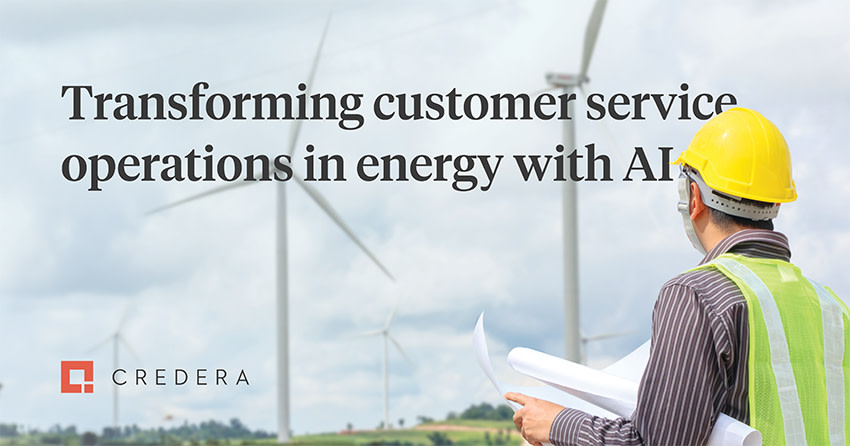AI
Sep 26, 2024
4 ways AI helps the energy sector enhance customer service while cutting costs

By 2026, 1 in 10 customer service interactions will be automated, according to Gartner, potentially reducing agent labor costs by $80 billion. The energy sector will be no exception, as AI can revolutionize customer service operations there, providing faster support while reducing service-related costs.
For example, by analyzing customer data, such as energy consumption patterns and billing history, AI can tailor interactions and recommendations to individual preferences, fostering stronger customer relationships without requiring additional resources. AI can also identify and present targeted offerings to customers based on their past interactions and energy usage patterns, driving additional revenue opportunities without incurring significant marketing costs.
In part one of our "AI in the Energy Sector" series, we shared Credera’s 10-step approach to help energy leaders confidently move forward with AI. In this article, we’ll take a look at four of the ways the energy industry can quickly leverage AI to make things easier for customers while boosting the bottom line.
1. Provide faster support while freeing up resources
AI-powered chatbots are at the forefront of customer service innovation in the energy sector. These intelligent bots can handle a wide range of customer inquiries in real-time, from billing questions to outage reports, to providing instant support and resolving issues. This speeds up response times and allows agents to focus on more complex tasks, optimizing resource allocation and improving overall efficiency.
Digital self-service channels, such as AI-driven FAQs and knowledge bases, also empower energy customers to get answers and information without needing to speak to anyone. In addition to reducing the volume of calls and other interactions, this approach ensures that customers receive timely assistance, improving satisfaction and loyalty. In fact, HubSpot found that 81% of customers prefer to use a self-service option over contacting a customer service representative.
When customers do need to talk with an agent, AI can assist representatives by summarizing customer information, generating accurate responses to questions, and saving them time on manual tasks like data entry. As an example, AI can quickly summarize a customer's energy usage patterns and provide tailored advice on how to reduce consumption.
2. Optimize staffing levels
Predictive analytics can forecast customer service demand based on historical data and trends in the energy sector. By accurately predicting peak times, such as during extreme weather events or billing cycles, energy companies can make sure enough agents are available when they’re needed without overstaffing during slower periods. This balance helps reduce labor costs while maintaining high levels of service.
3. Route and prioritize calls
AI can intelligently route and prioritize incoming calls based on the nature of the inquiry and the customer's profile. This means high-priority issues like power outages can be addressed promptly, improving the overall efficiency of the customer service team and enhancing the customer experience. This ensures that critical issues are resolved quickly, maintaining customer trust and satisfaction.
4. Improve the experience without increasing costs
Even when cost reduction seems tenuous, AI can still maximize the impact of an energy company’s marketing spend. Utility providers, for instance, can leverage energy consumption trends analysis and next-best action algorithms to tailor offers to their customers. In this sense, “return on marketing” can be recast as “experience per dollar.”
This level of personalization fosters stronger customer relationships and drives additional revenue opportunities without additional resources or significant investment. The key is to make sure the value added to the customer experience outweighs any additional costs, maximizing the "experience per dollar" ratio.
Case study: AI-powered chatbot revolutionizes engagement in highly regulated industry
As an example of our work in this area, a Fortune 500 global company in a highly regulated sector enlisted our help in developing a prototype for a moderated data-retrieval chatbot. The company needed an easy, interactive—and compliant—way to provide access to detailed information and wanted to move quickly from proof-of-concept (POC) to a mature product.
Designed to gather feedback from user testing and bridge this gap, our prototype took an innovative approach to moderation and compliance, supporting multiple languages and ensuring safety when shared with external users. The result was an interactive chatbot that revolutionized traditional engagement and paved the way for future enhancements.
The bottom line
Our specialists have developed repeatable, actionable plans you can follow to quickly leverage the power of AI and drive efficiency and growth in your customer service operations.
Schedule a call with us to see how we can help you transform your customer service strategy with AI, and check out the rest of our content in the AI in Energy series here:
Contact Us
Ready to achieve your vision? We're here to help.
We'd love to start a conversation. Fill out the form and we'll connect you with the right person.
Searching for a new career?
View job openings




